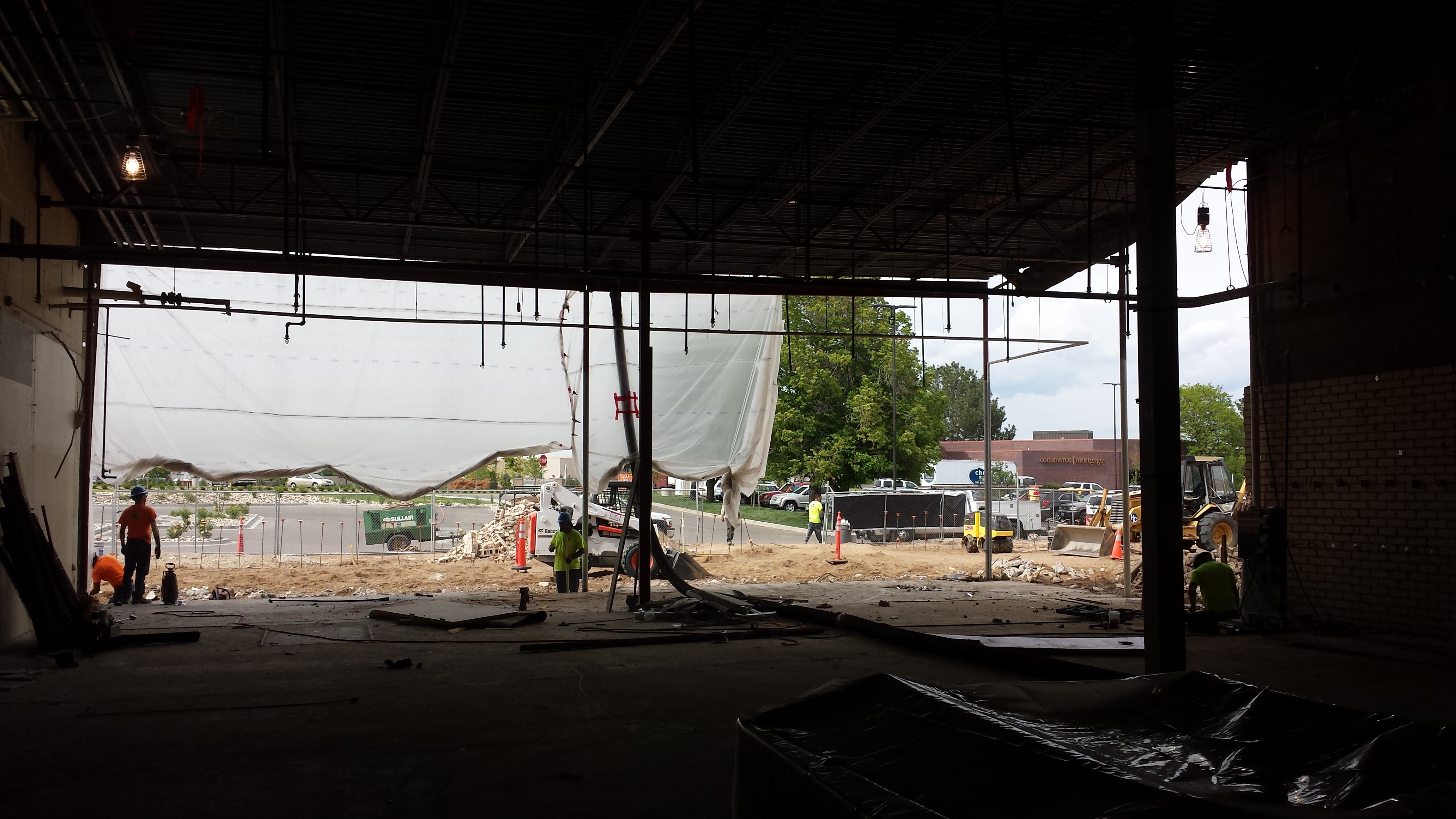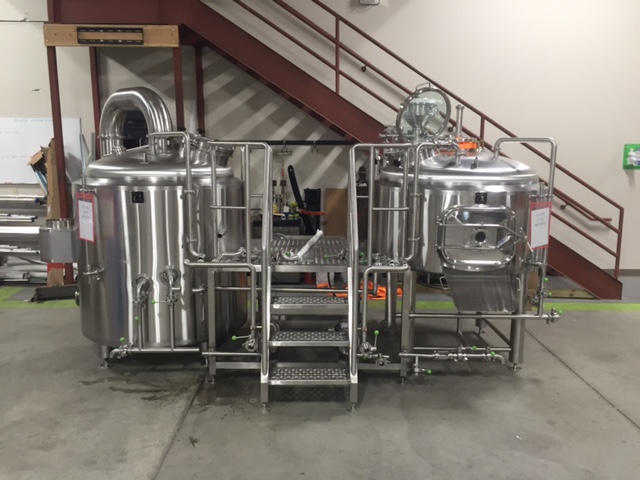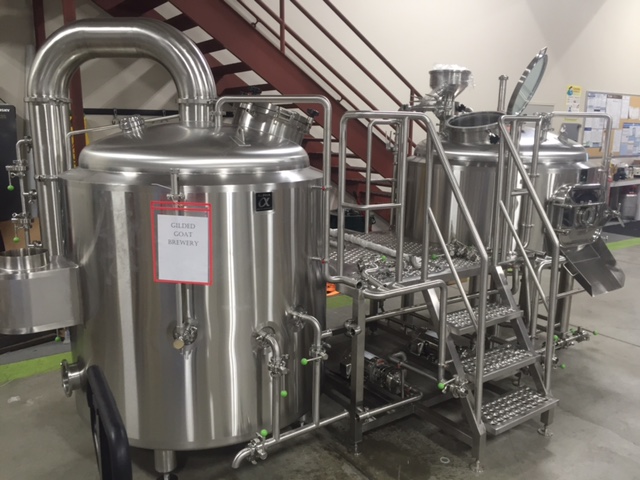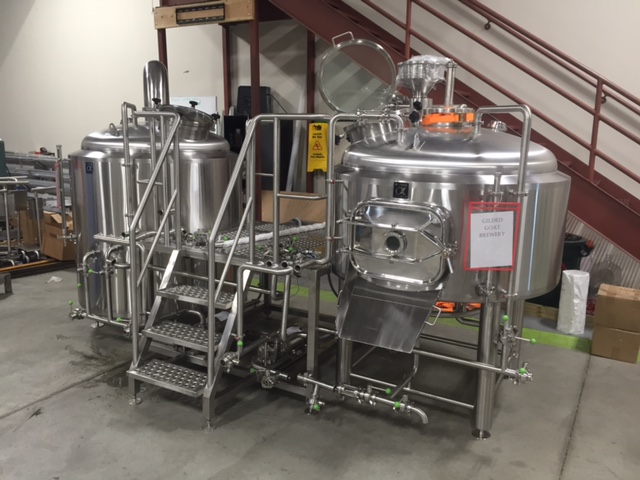- Joined
- Apr 13, 2013
- Messages
- 1,987
- Reaction score
- 965
Woo-Hoo! Congrats!

Excellent suggestions, thanks! Any idea if this would be something that a metal fab shop (or something similar) would normally do? Or maybe get the particular metal cut then add a patina ourselves? We have seen some amazing things done with a patina on copper or brass, and it would keep with our gilded theme.
So....its now too late to change the name to "Brown's Shoe Fit Co"? oh well....
congrats man
This is really important!
Those ridiculously amazing IPA's you guys all make at home - Ya. Those don't always translate well to 10 bbl batches. That takes a LOT of work and dedication. There's a reason IPA's are the full on rock-stars of the festival world.
I was curious what the larger scaled recipe does compared to the homebrew size? Are you having to adjust hop amounts, hop addition times, or grain bill? Have you found a modification that works best for you?
Colohox....
what have you found to be the biggest difference so far from going from homebrewer to probrewer as you helped out at the local breweries?
Good luck to both of you!
















Uh... Then there's the feds to consider. They sort of take exception when you don't know how many pints you're selling... Kind of a tax thing and all that.I was asking another brewer/owner about his business recently and he had no idea how many pints he was selling per week. Not that he didn't just know of the top of his head, they weren't keeping track.
Plus, you gotta factor in how many snarky dumb@sses like me are gonna show up looking for something that is steel toed for work, also provides arch support, but wont break the bank.
Impressed by the in depth research. Definitely more than most breweries try to plan ahead. I think most just open, constantly run out of favorites, then find their groove.
Do you think the amount of people there will be more fluctuating and unpredictable when you first open? I would think the first month could be unusually busy if you advertised well and stuff. Dont worry, ive been taking care of sending out ads under what Im calling your "heritage" name
I live right in the middle of a quaint downtown "arts district" area, right next to a brewery. Festivals, shows, parades, and other events have a huge impact on them. I go in there some fridays and its like crickets. I get to chat a lot with the brewers though, which is nice. Then others, its so packed I just prefer to drink my pint in the back where they brew and hide out there. I'm guessing you guys will be one of the breweries that's friendly to homebrewers.
Subscribed. I think many of us share a secret dream to one day make it in the beer industry. I know I do. It sounds like you and I also share a love (read: obsession) for organization and planning. Honestly, to me the entrepreneurial and business planning part sounds just as interesting as the brewing.
For the time being I'll live and suffer vicariously through you. Keep up the good work!
Uh... Then there's the feds to consider. They sort of take exception when you don't know how many pints you're selling... Kind of a tax thing and all that.
I don't know if you are asking specifically about brewing issues, or just in general, but prepare for a wall 'o text. Every brewery has a different approach to their brewing and their business. I have accumulated a "global" view of the process, after spending time with various people that links together the various moving parts, taking things I liked from particular places.
A production brewer must adjust every one of the things you mentioned. Large scale brewing has higher hop utilization overall and often vastly decreased amounts of roasted malts, for example. We will be dealing with up scaling recipes when our equipment arrives in June. Many issues are equipment specific as well but this is just a small piece of the puzzle. Making good beer isn't even close to enough if you want a successful brewery.
I think my biggest take away, which probably has the most to do with my personality, is the amount of planning that should go into production level brewing. There are so many moving parts involved in keeping your brewery machine running. If you follow the process from raw materials to pint glass, every step along the way needs to be planned for and adjusted, if necessary. A local brewery ran out of beer after being open 3 weeks. That kind of stuff drives me crazy! Of course, many things could come up that no one thought about, but how hard is it to look at your taproom volumes, production schedule, and raw material orders? I understand that you can't force a beer to ferment faster or that maybe there were an average of 100 people in the taproom on Fri/Sat peak times and you were only expecting an average of 80, or you ran out of your secret hop...these things happen. Successful breweries need to be able to monitor things like this before they start pouring beer. I have the perspective that (s)he who has the most data wins!
To this end, we created a pretty thorough taproom demand forecast. This forecast estimates the number of people in the taproom per hour/day/week, how much they are drinking, how long they are staying, etc. These numbers tell us how much beer we need to be producing to meet the demand. Of course, these are estimates. We will adjust these numbers as we accumulate hard data. Our prediction for Tuesdays (a notoriously slow brewery day, unless special events are planned to bring people in) is that we will serve about 100 people during the 6 hours that we are open, which is an average of 13% of our capacity over the 6 hours. We expect 200-16 oz pours, or 3200 oz to be served during this time. These numbers are then fed into our revenue model. As we get hard data for people/day and oz. served, these numbers will automatically adjust the other dependent aspects of our demand model and revenue model, providing alerts when we hit the minimum number of pints sold/day depending on the average expected capacity that day, or when we didn't. These numbers will accumulate until we know what we need to sell per day and per week, on average, to be in the black (used very loosely here), or if we need to do something on slow days to boost our sales. Friday and Saturday, we expect to sell about 14,000 oz over the two days, which is using an estimate of an average of 28% capacity. If we are actually at 70% capacity over these two days, which would be awesome, we instantly know that we need to increase supply.
If we have 2 weekends in a row that we are at 100% capacity for longer than we estimated (from 2pm to 8pm, instead of 3pm to 5pm for example), we may run into trouble, but the fact that we are actively monitoring these things and have models in place to help us predict or forecast how these changes will affect us will help in every stage. Those two weekends of higher capacity will trigger a new malt order sooner than normal. The peaks and troughs in our data will smooth out over time as well.
I was asking another brewer/owner about his business recently and he had no idea how many pints he was selling per week. Not that he didn't just know of the top of his head, they weren't keeping track.
Maybe that is the actual take away...the jump from homebrewing to commercial brewing isn't about making larger volumes of good beer and adjusting your recipes, it's about keeping track of the BUSINESS of your beer. People complain that opening a brewery would ruin the hobby for them, and they are right, but not just because it's more work or that you are doing it more often: You are now running a business, it is no longer a hobby.
If you were actually asking about the differences related to brewing, then I'm sorry to put you through all of that. I know that homebrewers (probably) don't monitor their pints consumed per week to decide if they will brew again. I'll happily talk about brewing issues as well. I just wanted to point out what, for me anyway, required the greatest amount of effort regarding the operation of the business itself.
One you get going you could also offer 2-3? day brew classes where a very small group comes in and works for you following your brewmasters suggestions to see what operating a commercial brewery is like.
As a new brewery. Don't do this. Focus on your business and getting going. It's a heck of a lot of work and you need to be focused on that.
I said ONCE YOU GET GOING! It would be an added revenue stream to offer classes!
You both bring up good points. Once we have some sort of operational consistency, we will be offering classes.
A few of us in the group have a lot of teaching experience. We would really like to offer classes of varying depth, if there is interest. Anywhere from basic brewing to complex brewing science. We have set aside funding for 6 part-time, temporary internship positions as well. Colorado State University recently started a fermentation science major and we would love to be able to give some of those students/graduates some hands on experience. We will also need to make sure we don't have any liability issues with having non-employees participating in the brewing process, if we choose to have a class that offers hands-on participation.
If you're developing a relationship with a nearly university, also look into the marketing department, either at the undergrad or graduate level. A lot of schools are trying to work real-world experience into the curriculums, so its a chance to build on that relationship and also possibly get some free advice and exposure.
I'm just down in Broomfield and would line to make the trip up to see you guys when you're ready!
Uh... Then there's the feds to consider. They sort of take exception when you don't know how many pints you're selling... Kind of a tax thing and all that.





What's the latest and greatest news ColoHox?
I'd be fascinated to hear about how filling the QC position goes for you. It sounds like it would be an excellent opportunity for a college student interested in beer, but I'm wondering how likely you are to find a candidate.
Edit: just saw your note about the CSU program, that's cool, and really improves the chance of that position being filled.

Just got an update on your brewery in my Fermentedly Challenged feed today. Sounds like things are moving along
